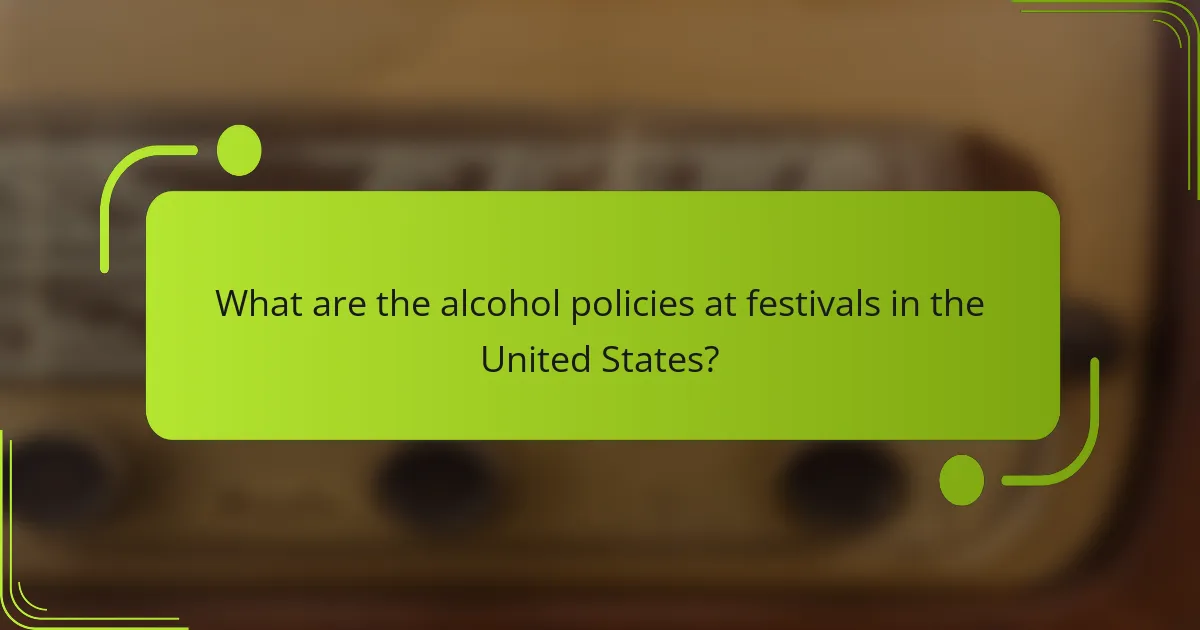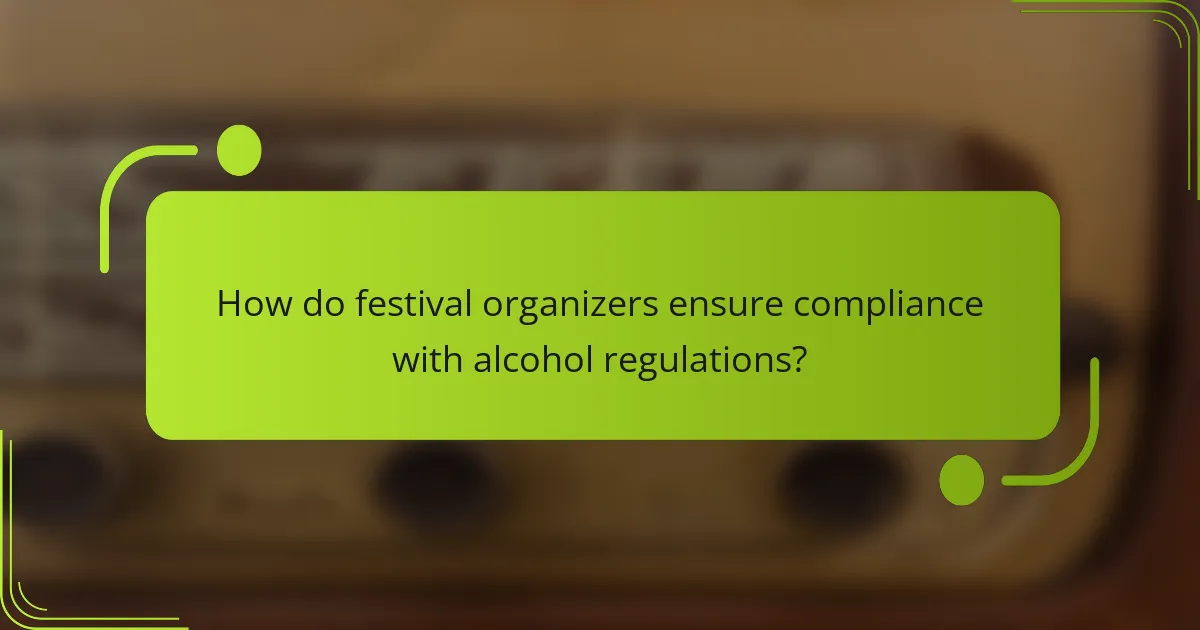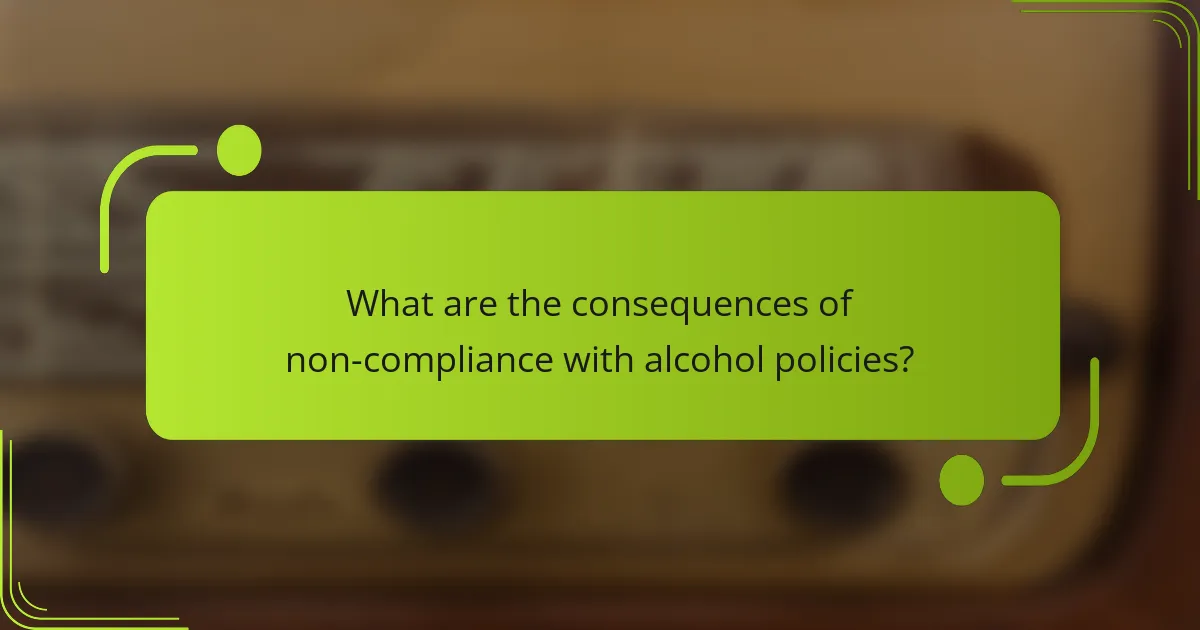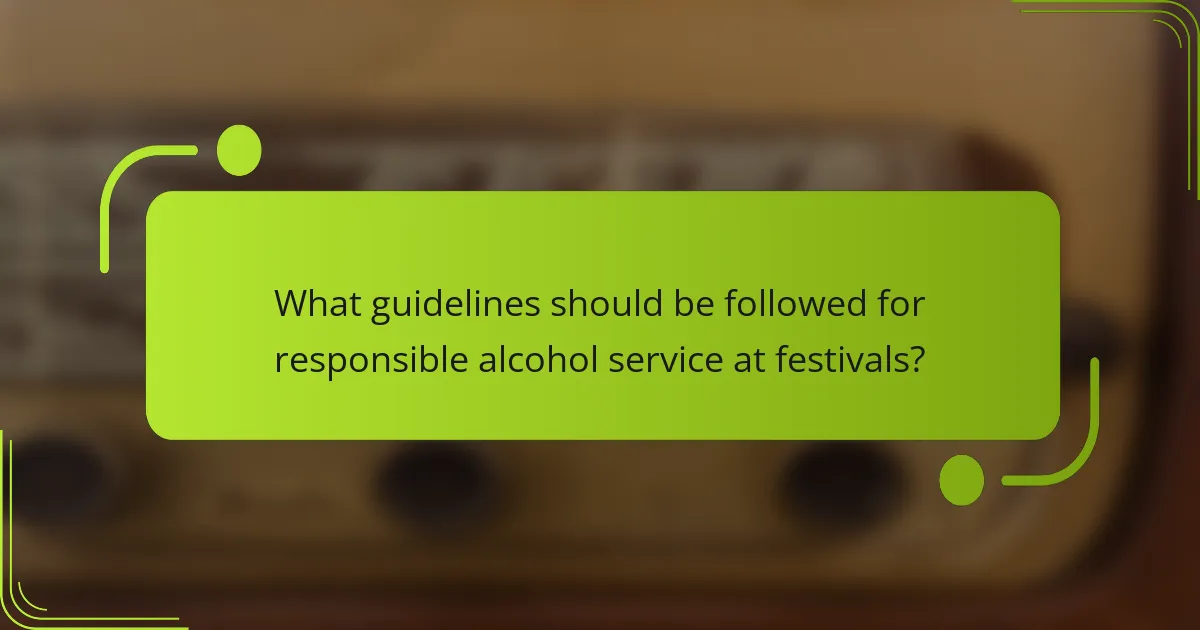Alcohol policies at festivals in the United States are shaped by a combination of state and local laws, as well as the specific regulations of each event. These policies are essential for ensuring the safe sale, consumption, and distribution of alcoholic beverages, while also promoting compliance with legal standards. Festival organizers play a crucial role in this process by obtaining permits, training staff, and conducting audits to create a secure environment for attendees.

What are the alcohol policies at festivals in the United States?
Alcohol policies at festivals in the United States vary widely based on state and local laws, as well as the specific regulations of the event itself. These policies dictate the sale, consumption, and distribution of alcoholic beverages, ensuring compliance with legal standards and promoting safety at large gatherings.
State-specific regulations
Each state has its own laws governing alcohol sales and consumption, which can significantly impact festival operations. For example, some states require a special permit for alcohol sales at events, while others may have restrictions on the types of alcohol that can be served or the hours during which sales are allowed.
Festivals must be aware of their state’s legal drinking age, which is typically 21 years, and ensure that proper identification checks are in place. Additionally, states may impose specific rules regarding the serving of alcohol, such as limits on the amount that can be sold to an individual at one time.
Local ordinances
Local governments often have their own ordinances that further regulate alcohol consumption at festivals. These can include zoning laws that dictate where alcohol can be sold, noise ordinances that limit the hours of operation, and health regulations that govern food and beverage service.
Festivals should consult with local authorities to understand any unique requirements or restrictions that may apply, as non-compliance can lead to fines or event shutdowns. Engaging with local law enforcement can also help ensure safety and compliance during the event.
Federal guidelines
While most alcohol regulations are managed at the state and local levels, federal guidelines set by the Alcohol and Tobacco Tax and Trade Bureau (TTB) provide overarching rules for alcohol distribution and labeling. Festivals must comply with these federal standards, especially if they are selling alcohol across state lines.
Additionally, festivals should be aware of federal laws regarding the advertising and marketing of alcoholic beverages, which aim to prevent misleading claims and promote responsible drinking. Understanding these guidelines is crucial for maintaining compliance and avoiding legal issues.

How do festival organizers ensure compliance with alcohol regulations?
Festival organizers ensure compliance with alcohol regulations by obtaining necessary permits, training staff, and conducting regular audits. These steps help create a safe environment while adhering to local laws and guidelines related to alcohol service.
Obtaining necessary permits
Securing the appropriate permits is crucial for festival organizers to legally serve alcohol. This often involves applying for a temporary alcohol license from local authorities, which may require detailed plans on how alcohol will be managed during the event.
Different regions have varying requirements, so organizers should check local regulations well in advance. This may include submitting applications several weeks or months before the event and paying associated fees.
Staff training programs
Effective staff training programs are essential for ensuring that employees understand alcohol service laws and responsible serving practices. Training should cover topics such as age verification, recognizing signs of intoxication, and handling difficult situations.
Organizers can consider partnering with local organizations that specialize in alcohol service training. Regular refresher courses can also help keep staff updated on any changes in regulations or best practices.
Regular audits and inspections
Conducting regular audits and inspections helps festival organizers maintain compliance with alcohol regulations throughout the event. These checks can identify potential issues before they escalate, ensuring that all aspects of alcohol service are being followed correctly.
Organizers should schedule audits at various stages of the event, including setup, during the festival, and after closing. Keeping detailed records of these inspections can also demonstrate compliance to local authorities if needed.

What are the consequences of non-compliance with alcohol policies?
Non-compliance with alcohol policies at festivals can lead to significant repercussions, including financial penalties, event cancellations, and damage to the event’s reputation. Understanding these consequences is crucial for organizers to ensure adherence to regulations and maintain a successful event.
Fines and penalties
Violating alcohol policies can result in substantial fines imposed by local authorities. These fines can range from hundreds to thousands of dollars, depending on the severity of the infraction and local regulations. Organizers should familiarize themselves with specific laws in their area to avoid unexpected financial burdens.
In some cases, repeat offenses may lead to increased penalties or even criminal charges against responsible individuals. It’s essential for festival organizers to implement strict compliance measures to mitigate these risks.
Event cancellation risks
Failure to comply with alcohol regulations can jeopardize the entire event, potentially leading to cancellation. Authorities may shut down festivals that do not adhere to legal requirements, resulting in lost revenue and wasted resources. Organizers should have contingency plans in place to address compliance issues proactively.
Additionally, securing the necessary permits and licenses well in advance can help prevent last-minute cancellations due to non-compliance. Regular communication with local regulatory bodies can also ensure that all requirements are met.
Reputation damage
Non-compliance with alcohol policies can severely damage an event’s reputation, affecting future attendance and sponsorship opportunities. Negative publicity from compliance failures can deter attendees and lead to a loss of trust among stakeholders. Organizers must prioritize adherence to regulations to maintain a positive image.
Building strong relationships with local communities and authorities can help mitigate reputation risks. Engaging in transparent practices and demonstrating a commitment to responsible alcohol service can enhance an event’s standing and attract a loyal audience.

What guidelines should be followed for responsible alcohol service at festivals?
Responsible alcohol service at festivals involves adhering to regulations that promote safety and compliance. Key guidelines include verifying the age of consumers, limiting alcohol sales, and providing non-alcoholic options to ensure a balanced experience for all attendees.
Age verification practices
Age verification is crucial for responsible alcohol service at festivals. Staff should be trained to check identification rigorously, ensuring that only individuals of legal drinking age can purchase alcohol. Acceptable forms of ID typically include government-issued identification such as a passport or driver’s license.
Implementing a system for wristbands or stamps can streamline the process, allowing quick identification of those who are of legal age. Regular staff training and clear signage about age restrictions can further enhance compliance and reduce the risk of serving underage individuals.
Limitations on alcohol sales
Setting limitations on alcohol sales helps to prevent overconsumption and maintain a safe environment. Festivals should establish clear policies regarding the maximum number of drinks an individual can purchase at one time, often limiting it to one or two drinks per transaction.
Additionally, implementing cut-off times for alcohol sales, such as ceasing sales an hour before the festival ends, can help manage consumption levels. Monitoring consumption patterns and adjusting sales strategies accordingly can further ensure responsible service.
Providing non-alcoholic options
Offering a variety of non-alcoholic options is essential for catering to all festival-goers. This includes providing soft drinks, water, and non-alcoholic beers or cocktails, ensuring that attendees have choices beyond alcoholic beverages.
Promoting these options through signage and staff recommendations can encourage their consumption. Additionally, pricing non-alcoholic drinks competitively can help make them an appealing choice for those who prefer to abstain from alcohol.

How do alcohol policies differ across major festivals in Europe?
Alcohol policies at festivals in Europe vary significantly, influenced by local laws, cultural attitudes, and specific event regulations. Understanding these differences is crucial for festival organizers and attendees to ensure compliance and a safe environment.
Comparison of UK and German regulations
In the UK, festivals typically require a Temporary Event Notice (TEN) to serve alcohol, which outlines the hours and conditions for alcohol sales. Conversely, Germany has a more flexible approach, allowing festivals to operate under local licensing laws, which can vary by state and often permit longer serving hours.
Additionally, the UK enforces stricter age verification processes, requiring organizers to implement robust measures to prevent underage drinking. In Germany, while age restrictions are also in place, the enforcement can be less stringent, particularly at outdoor events.
Variances in enforcement practices
Enforcement of alcohol policies can differ widely between countries. In the UK, local authorities often conduct regular inspections during festivals to ensure compliance with licensing conditions. This can include checking for proper age verification and monitoring alcohol consumption levels.
In contrast, German festivals may rely more on self-regulation by organizers, with local police intervening only in cases of significant disturbances. This can lead to a more relaxed atmosphere, but it also places the onus on festival organizers to maintain order and safety.
Festival-specific guidelines
Many festivals develop their own specific guidelines regarding alcohol sales and consumption. For instance, some UK festivals may limit the types of alcohol sold or implement drink limits per transaction to promote responsible drinking. These guidelines are often communicated clearly to attendees through signage and event programs.
In Germany, festivals may adopt unique approaches, such as offering a wider variety of local beers and wines, reflecting the country’s rich brewing culture. Organizers often encourage responsible drinking through initiatives like providing free water stations and promoting public transportation options for attendees.

What are emerging trends in alcohol policies at festivals?
Emerging trends in alcohol policies at festivals focus on promoting responsible consumption, enhancing safety, and ensuring compliance with local regulations. Many festivals are adopting stricter age verification processes, implementing cashless payment systems, and offering a wider range of non-alcoholic options.
Increased focus on responsible consumption
Festivals are increasingly prioritizing responsible drinking by providing education on alcohol effects and promoting moderation. Initiatives such as free water stations and designated driver programs are becoming common, encouraging attendees to stay hydrated and make safe choices.
Some festivals are partnering with local organizations to offer workshops or informational booths that discuss the risks of excessive drinking. These efforts aim to create a safer environment and reduce incidents related to alcohol misuse.
Enhanced safety measures
Safety measures at festivals are evolving, with many events implementing stricter security protocols and health checks. This includes thorough bag checks and the use of wristbands that track alcohol consumption, ensuring that attendees do not exceed safe limits.
Additionally, some festivals are employing trained staff to monitor alcohol consumption and intervene when necessary. These proactive measures help maintain a safe atmosphere for all participants.
Adoption of cashless payment systems
Cashless payment systems are becoming a standard feature at festivals, streamlining transactions and reducing the risk of overconsumption. Attendees can preload funds onto wristbands or cards, making it easier to manage spending and track purchases.
This system not only enhances the festival experience but also allows organizers to monitor alcohol sales and adjust offerings based on real-time data. It can lead to more responsible drinking habits as attendees can see their spending at a glance.
Expansion of non-alcoholic options
As awareness of health and wellness grows, festivals are expanding their non-alcoholic beverage selections. This includes craft mocktails, non-alcoholic beers, and a variety of soft drinks, catering to a broader audience and promoting inclusivity.
Offering diverse non-alcoholic options encourages attendees to choose alternatives, reducing overall alcohol consumption. Festivals that prioritize these offerings often see increased satisfaction and attendance from individuals who prefer not to drink alcohol.


